Download the full print version of the infographic here.
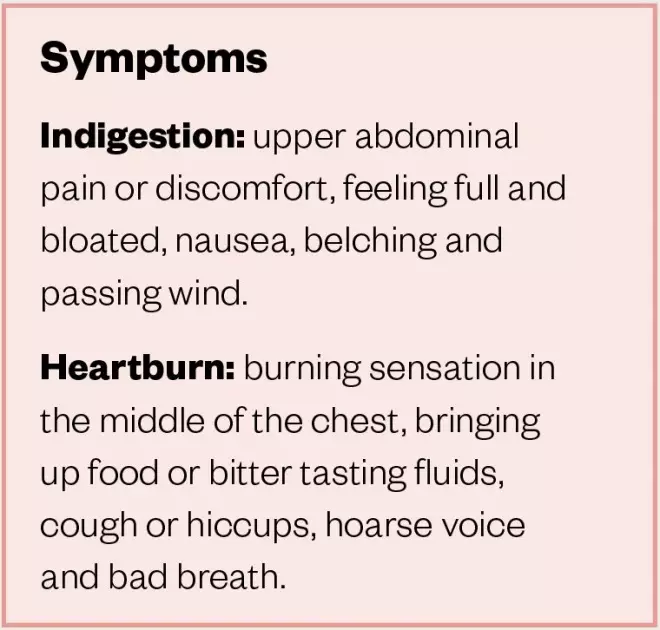
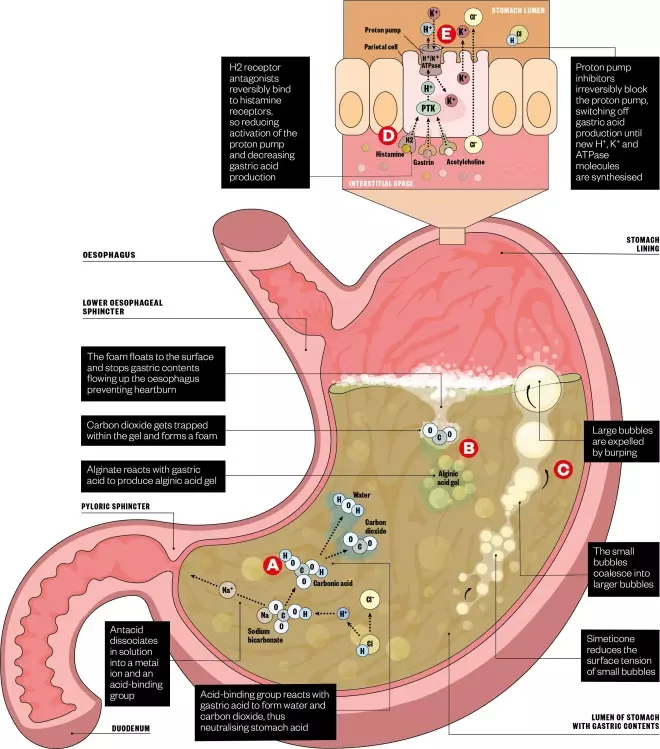
Relief from indigestion
Illustration: Alisdair Macdonald
ATPase; adenosine triphosphatase; C: carbon; Cl: chlorine; Cl-: chloride ion; H: hydrogen; H+: hydrogen ion; K+: potassium ion; Na+: sodium ion; O: oxygen; PTK: protein tyrosine kinase
A. Antacids
Over-the-counter (OTC) medicines: combinations of magnesium trisilicate, magnesium carbonate, magnesium hydroxide, aluminium hydroxide, calcium carbonate, sodium bicarbonate and potassium bicarbonate.
Not recommended for: children (but see individual products). Avoid sodium-containing antacids in those with impaired kidney or liver function, hypertension, those on a salt-restricted diet and pregnant women. Avoid antacids that contain potassium in patients taking potassium-sparing diuretics or angiotensin-converting enzyme inhibitors. Avoid antacids ithat contain calcium in people on thiazide diuretics. Excessive use of antacids containing magnesium may lead to hypermagnesaemia, especially in people with renal insufficiency.
Interactions: avoid taking other medicines within two to four hours of antacids. See individual products for specific interactions.
Counselling points: liquids and powders act fasterand have greater neutralising capacity, but tablets are more convenient. Best taken when symptoms occur or are expected, usually between meals and at bedtime. Inform people with diabetes that many antacids have a high sugar content.
B. Alginates
OTC medicines: magnesium alginate and sodium alginate, often in combination with antacids.
Not recommended for: children aged under 6–12 years old (depending on product); caution advised for people on low-sodium, low-potassium or low-calcium diets.
Interactions: avoid taking other medicines within two to four hours of alginates.
Counselling points: best taken after meals and at bedtime.
C. Antiflatulents
OTC medicines: simeticone, sometimes in combination with antacids.
Not recommended for: N/A.
Interactions: none reported.
Counselling points: take three to four times daily or as required. Not absorbed, so are considered safe in pregnancy and breastfeeding.
D. H2 receptor antagonists
OTC medicines: ranitidine (several products were recalled in 2019 because of possible contaminants and ranitidine was out of stock at time of going to press).
Not recommended for: people with renal or hepatic impairment, porphyria, children, pregnant or breastfeeding women. Do not sell to people taking non-steroidal anti-inflamatory drugs because they could mask the symptoms of peptic ulcer disease.
Interactions: bioavailability of certain drugs may be affected by the change in gastric pH (e.g. erlotinib, triazolam, midazolam, glipizide, ketoconazole, atazanavir, delaviridine and gefitnib). Close monitoring required with concurrent warfarin.
Counselling points: take before consuming food or drink known to cause indigestion. Maximum two tablets in 24 hours.
E. Proton pump inhibitors
OTC medicines: esomeprazole and pantoprazole.
Not recommended for: children, pregnant or breastfeeding women.
Interactions: bioavailability of certain drugs may be affected by the change in gastric pH (e.g. erlotinib, triazolam, midazolam, glipizide, ketoconazole, atazanavir, delaviridine and gefitnib). Close monitoring is required in patients taking concurrent warfarin. Co-administration with antibiotics increases the risk of Clostridium difficile up to three-fold.
Counselling points: take 30–60 minutes before the first meal of the day, or split the dose, with the second dose taken 30–60 minutes before the evening meal. May take two to three days to achieve improvement. Once relief is achieved, discontinue treatment. Stop taking proton pump inhibitors two weeks before a Helicobacter pylori test.
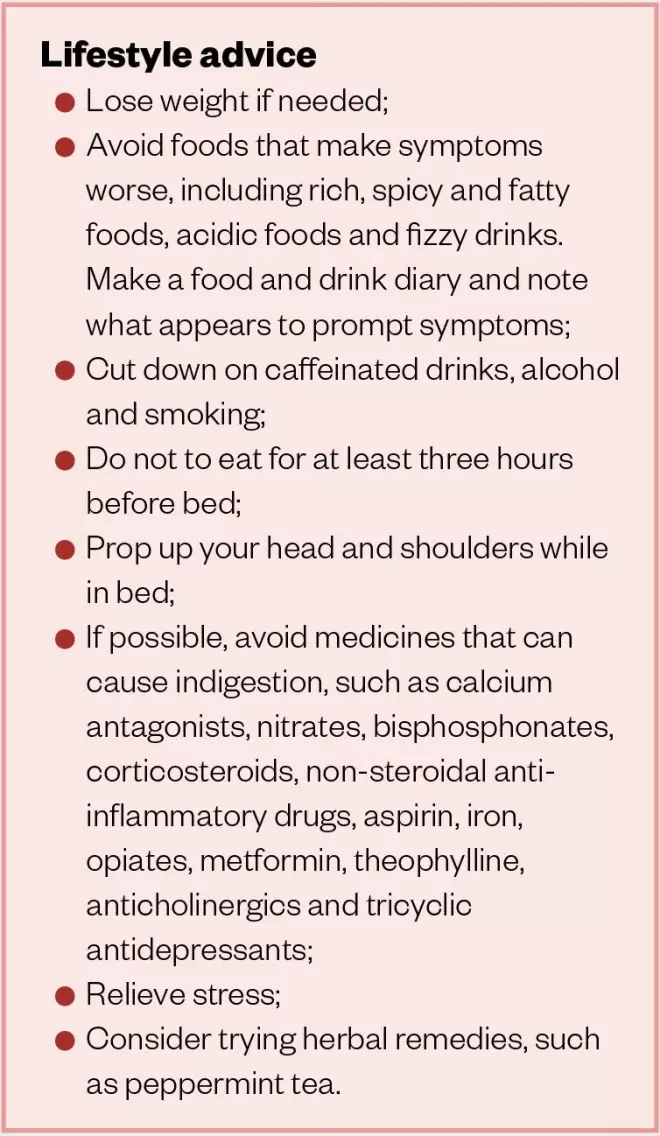
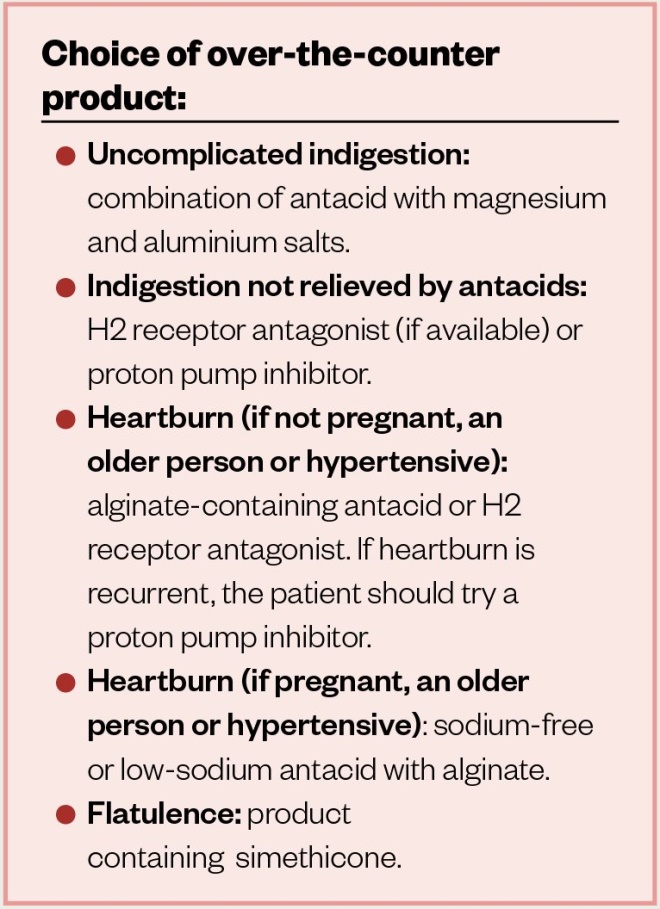
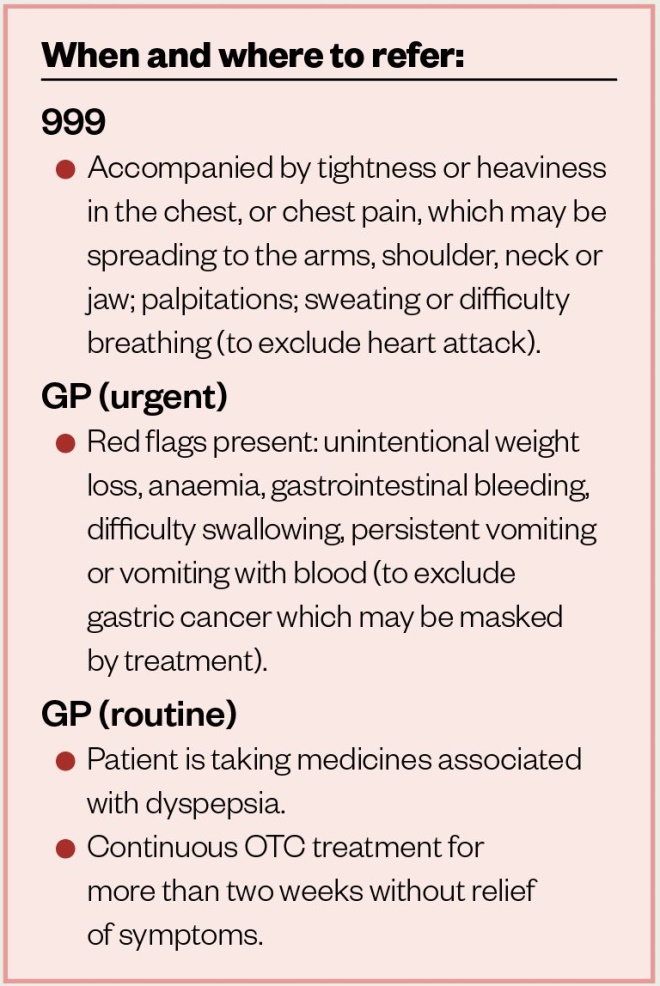
References
Sources: Aliment Pharmacol Ther 2002;16(10):1689–1699, British National Formulary, Bupa, eMC, National Institute for Health and Care Excellence, Non-prescription Medicines (4th edn), OTC directory online.
Editorial advisers: Sarah Cripps, consultant pharmacist, gastroenterology/hepatology, Oxford University Hospitals NHS Trust; Ade Williams, community pharmacist, Bristol; Anja St. Clair Jones, consultant pharmacist gastroenterology, Brighton and Sussex University Hospitals NHS Trust.


